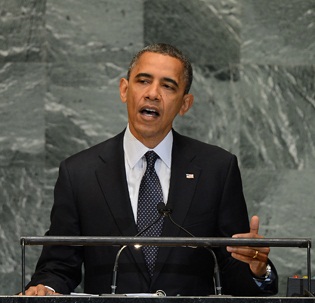
One in three Native American women will be raped at least once in her lifetime. And that’s why President Obama’s signing of the Tribal Law and Order Act today is so vital. Tribes will now have the right – and the resources – to investigate and prosecute rapes perpetrated by non-Natives on tribal lands.
For 500 years, rape has been used as a tool of conquest and an act of war against Native women. It carries with it all of the perverted power of violence that every rape survivor endures, with the added yokes of colonialism and cultural annihilation.
Sadly, not much has changed.
One in three. At least once.
Think for a moment about the implications. We know that rape survivors are often reluctant to report the attack, for fear of not being believed; of being told that they “asked for it”; of being humiliated and shamed; of reprisals.
But in Indian Country, rape survivors bear additional burdens. They must report their crimes to federal law enforcement authorities, whom long and hard experience has told them to distrust. Cultural sensitivity is often nonexistent. Often, the law enforcement officers, investigators, prosecutors and health examiners are white men, and for many Native women cultural traditions may militate against talking to them about such intimate matters. So when you read that one in three Native women will be raped at least once in her lifetime, you can be assured that those numbers are underreported at even greater rates than in the general population.
Here’s a little context:
• Native Americans are more than twice as likely, compared to all other ethnic groups, to experience some form of sexual assault.
• 90 percent of Native women who report being raped also report being physically battered in other ways during the rape, compared to 74 percent of rape survivors in the population as a whole.
• 50 percent of Native women report experiencing other physical injuries in addition to the rape itself, compared to 30 percent in the population as a whole.
• 34 percent of Native women report that a weapon was used during the commission of the rape-a number more than three times that of the general population.
• While most rapes occur within racial groups, this is not true for Native women. More than 86 percent of the offenders are non-Indians, and more than 70 percent are white.
This last statistic matters a great deal.
Because until today, Native women raped by a non-Indian assailant had virtually no recourse. With rare exceptions, only federal law enforcement authorities have had jurisdiction to arrest and prosecute non-Native offenders on tribal lands. And historically, federal authorities have cared little about such cases: Federal authorities routinely decline to prosecute more than 50 percent of all violent crimes committed in Indian Country; the rate of declination is much higher for sexual assault cases.
Today that will change. The Tribal Law and Order Act will substantially expand tribal jurisdiction over non-Native offenders for crimes of sexual violence, and providing desperately needed resources to tribes to help them prosecute such cases. Introduced in 2009 in the House by Rep. Stephanie Herseth-Sandlin (D-SD) and in the Senate by Sen. Byron Dorgan (D-ND), the legislation is a watershed in tribal law. Provisions include:
• Deputizes tribal police to arrest and prosecute non-Natives who commit crimes on tribal land
• Provides tribal police with access to National Crime Information Center (NCIC) and other federal databases containing criminal records and other information
• Requires the Department of Justice to maintain records on all declinations and to share that information, as well as any evidence, with tribal authorities
• Requires federal officials to turn over to tribal authorities any documents and testimony that may aid tribal court prosecutions
• Raises the maximum sentence that tribal courts can impose on an offender from one to three years
• Provides tribal police with targeted training in evidence collection and interviewing of sexual and domestic violence survivors
• Requires the Indian Health Service (IHS) to implement consistent protocols at all facilities for treating sexual assault survivors
• Reauthorizes and enhances programs to support tribal police, courts, and corrections programs
• Provides programs for at-risk young people on reservations.
Is it perfect? Of course not. But it’s an enormously important first step.
Today, we who have worked in our Native communities with survivors of sexual violence have reason to celebrate. Come and dance with us.
NOTE: This post first appeared at Ms.blog, the blog of Ms. Magazine, here.


This is a huge step we have been working towards for years.
Meet my co-worker:
White Buffalo Calf Woman Society, Inc. started the coalition Lisa helps run. Last year, they got a coalition grant and broke off from White Buffalo Calf – they concentrate on the education end of our work, but also fund one Sexual Abuse advocate.
Right now, White Buffalo Calf is fighting for its life – as the tribe is trying to force us under a tribal charter – which it has never done it its 33 years of existence.
White Buffalo was the first domestic abuse shelter on a reservation and the first shelter for women of color in the nation. It was started by women and has always been run by women.
Most of the shelter activities and staff have been funded by grants given only to tribes, but which require them to partner with a non-profit. Our grantwriter writes the grants, which also fund several law enforcement and domestic abuse court positions and does most of the reporting, but payments to us have to pass through the tribe. We do submit documentation for reimbursement of our expenses under these grants and the tribe can review and question any request.
I can’t say a lot right now as we spent all day Wed. in front of the tribal council trying to defend ourselves against allegations made by women we helped. The issue was not resolved on Wed and has been continued until Monday. You can read a bit more on
Anyway, while Lisa was in DC with the President, our executive director was having to lay off most of our shelter advocates, including our lead advocate who has been there forever – after suffering domestic abuse herself, our Criminal Justice Advocate, our Legal Advocate (does things like protection orders for women), our Sexual Assault Advocate, our part-time media person, the man who leads the mens’ group (which most men have to attend by court order – kind of a reeducation program for abusers), and the part time maintenance worker. We also cut salaries for our Executive Director, grantwriter and our bookkeeper. Despite knowing that they were probably going to be laid off, most of these people have continued working without pay. They have stayed on call when assigned to respond to women in need in the middle of the night.
While we are trying to respond to any woman in need, we can no longer allow women to stay in our shelter as long as they need – but instead have had to arrange transfers to other shelters across the state. Now, even most of those who have continued working for nothing are having trouble getting the gas money together to drive in. Our legal advocate, is in her 60s, single and has a mortgage and car payment – things are going to get very hard for her fast.
Last year, we got 3 grants that do not have to go through the tribe, including the one I am on. We think this is part of the reason this whole thing came up – we were getting some funding the tribe has no control over.
We were very lucky that the regional ACLU has a young attorney dedicated to helping tribal women and drove out 5 hours to help us.
We are praying and trying to keep things going the best we can, while getting our biannual grant reports done and submitted, our new grant solicitations done and fighting against what feels like a set up and conspiracy.
To see our sister, Lisa, up there with President Obama gave us a much needed shot of pride today. We worked hard for this Act and it is way past time for it to have come to pass.
Peace and Blessings
Not just the video, which is wonderful, but also the info about the WBCWS’s dire straits. I had heard that you folks were having difficulties, but I had no idea how bad it was. Is there anything we can do to help? Or if it’s something that shouldn’t have NAN’s involvement as a group, is there something I – and anyone else who wants to assist – can do on an individual basis to help?
WBCWS has been a lifesaver for so many women for decades. We can’t afford to lose what you folks provide.
My heart goes out to you and every volunteer that has given blood, sweat and tears to this effort.
It’s overwhelming for me right now to deal with this.
I don’t know how you face it day after day, you are our warrior sister.
Much love to you and thanks so much for the video.
We are all praying and learning – seeing mistakes we made and vowing to come through stronger and better.
We were warmed that women from other shelters and coalitions around the state came to stand with us on Wed.- even when a few were flying out to D.C. this morning for the signing of this Act. Regrettably, the tribal council acted in a closed session so only our board members who were not going to speak and Tillie Black Bear, our executive director were in the room for most of it.
Depending on how things go on Monday, the National ACLU may jump in with more support.
What is really amazing is that in June, we were honored to host , , , and another woman, I only remember as “Carol” who is a deputy attorney general of some flavor, at our offices for an afternoon. They toured the shelter, ate fry bread in the kitchen with some residents and then attended a meeting we arranged with members of tribal law enforcement, a judge, prosecutors and hospital personnel to listen to how we worked together to serve the needs of women and problems we needed help with.
Then just a week ago, the DoJ sent videographers they contract with to make training videos to interview Tillie and some other staff members and a police investigator about how we handled instances of domestic abuse and sexual assault. The purpose? Creating training videos for prosecutors, judges, tribal and non-tribal law enforcement personnel about how to handle abuse/assault situation.
Now suddenly, the tribe believes we are an unsafe environment or something.
Help needed? Money of course. But lets see how things progress. We may really need some help with publicity after next Monday.
We can apply for grants open to all shelters and non-profits – they are just a lot more competitive and harder to get.
I am considering asking to be laid off so the woman who is the Legal Advocate could have my job and still be able to assist with the protection orders, etc. She just isn’t sure she could do my job – though I am sure she could. And after I was on unemployment for 8 months last year, I am not totally out of that hole – admittedly scared that at my age, I might be cutting my throat – plus my grant is up in April next year, so it isn’t a great life line for her unless I get other grants I am applying for.
Got lots of praying to do on that.
We are all kind of overwhelmed around here as well.
Just noticed the time – I need to get some sleep. Full day tomorrow.
Thanks for your care and concern as always.
coming from this quarter.
Frankly, I don’t believe for a moment that they believe it’s an “unsafe environment.” Someone (or multiple someones) is looking for control.
Please do keep me posted, both on this and on you personally. If it turns out I can help in some way, just say the word, and you’ve got it.
Get some rest; here’s hoping for some good news between now and Monday.
Monday was another full day in front of the tribal council – mostly in closed session. And at the end of the day, they tabled the issue for 60 days….
No time for more details right now, but good needs is that as we jump through a few hoops for them this week, the staff that was laid off is back with promise of back pay and we are mostly normal for a while longer.
The shelter is already full of the sounds of women and children secure in having some safety.
Thank you all for your prayers.